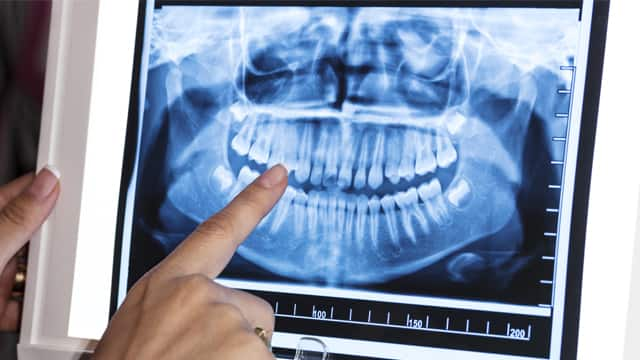-
-

FLUORIDE
What Is Stannous Fluoride Toothpaste?Discover what is Stannous Fluoride Toothpaste and its importance to prevent cavities and other oral health problems.

TEETH WHITENING
Whitening toothpaste - hydrogen peroxide vs. carbamide peroxideIf you lose one or more of your front teeth due to injury or decay, you may feel ...
-
Science & InnovationOral Health Commitment
- Oral Health Commitment
- Bright Smiles, Bright Futures
- Educational Resources
- Mobile Dental Van
- Volunteer
- ORAL HEALTH CHECK
- PRODUCT MATCH
- Oral Health and Dental Care | Colgate®
- Oral Health
- What Is Hyperdontia?


Do you know how many teeth adults have? 32. What about baby teeth? If you said 20, boom, you won again. And for our final round, what is the name of the condition when you have too many teeth? That is called hyperdontia. We would've also accepted supernumerary teeth. While we aren't handing out any trivia points, we can point out all of the ins and outs of hyperdontia — and that wealth of dental health knowledge is a prize in itself.
How Many Teeth Is Too Many
We've established 32 is the magic number for adults. And the majority of hyperdontia cases aren't severe with just 1-2 extra teeth popping up. The causes of these extra teeth are still unknown, but many cases link to specific genetic factors. A large number of people diagnosed with hyperdontia also live with one of these genetic conditions:
- Ehlers-Danlos syndrome
- Gardner's syndrome
- Down syndrome
- Cleft lip or palate children
What Are The Risks of Hyperdontia
Sometimes, you may have hyperdontia that will require little to no dental attention. And chances are, you won't know you have it until after a dental exam or X-ray. The extra teeth could cause pain, discomfort, and affect your chewing and eventually lead to other oral health concerns, such as:
- Crowded and displaced teeth leading to the blockage of your primary teeth from coming in properly
- Pressure can build in your teeth when a tooth doesn't come in straight, leading to impactions
- Cysts and tumors can form from hyperdontia
- Supernumerary teeth can create malocclusions or issues with your bite, alignment, and jaw position
- The more teeth, the better chance for tooth and gum infection, decay, and periodontal disease
- Facial deformities and speech impediments are possible in the most severe cases
How To Treat Supernumerary Teeth
There are a few courses of action when looking into hyperdontia treatment. Each treatment depends on your age and the number of overgrown teeth. Be sure to speak with your dental or orthodontic professional to go over your options. Possible treatments include:
- Wait and see if there aren't any immediate complications
- Tooth extraction
- Orthodontic solutions
It's impossible to control if and how hyperdontia affects you. What you can do is regularly brush, floss, and see your dental professional so they can assess your oral health and recommend any treatments as necessary. If you do that and keep your teeth, mouth, and smile in tip-top shape — you'll be a winner.
Oral Care Center articles are reviewed by an oral health medical professional. This information is for educational purposes only. This content is not intended to be a substitute for professional medical advice, diagnosis or treatment. Always seek the advice of your dentist, physician or other qualified healthcare provider.
Related Articles

Mouth and teeth anatomy
What Are Dentin Tubules?Have you heard of the term dentin tubules? Well, now you have. Dentin tubules are a vital part of your teeth. As you may know, the teeth are made up of tissue layers, and each one serves a unique function. The dentin tubules are located in the dentin, one of the layers below the enamel surface. The role of dentin tubules is to help you feel sensations in your teeth. That's also why they're often blamed for hypersensitivity in people's teeth.

Mouth and teeth anatomy
What Is Hypodontia? Causes And Treatments For Missing TeethHypodontia refers to the absence of one or more teeth. Learn how this condition is diagnosed and treated.

Mouth and teeth anatomy
What Are Foliate Papillae?Hundreds of tiny bumps called papillae cover your tongue, most of which contain taste buds with sensory cells. There are four types of papillae—filiform, fungiform, circumvallate, and foliate—and each has a role to play. This article looks into the foliate papillae, which are located on the sides of the tongue and contain taste buds.

Mouth and teeth anatomy
Your Baby's Labial Frenulum: What You Need To KnowTucked inside your infant's gummy, toothless smile is a small piece of tissue under their upper lip called the labial frenulum.
Related Products

Colgate Total Active Prevention Whitening Toothbrush is a soft toothbrush with charcoal infused spiral and Floss-Tip bristles (1). This soft bristle toothbrush fights the root cause* of cavities, plaque, gingivitis, bad breath, tartar buildup**, and stains*** and also helps remove surface stains to prevent stain buildup.

Power away plaque with Colgate Total Battery Powered Toothbrush. This battery operated toothbrush for adults fights the root cause* of cavities, plaque, gingivitis, bad breath, tartar buildup**, and stains***. Plus, this battery toothbrush has a built in 2 minute timer and features two cleaning modes, Sensitive and Regular, to cater to your unique oral care needs.

The Colgate Total® Active Prevention Foaming Clean Soft Bristle Toothbrush is specially designed to tackle the root cause* of cavities, plaque, gingivitis, bad breath, tartar buildup**, and stains***.

Colgate Total Alcohol Free* Gum Health Mouthwash delivers 24-hour protection** against bacteria and also helps prevent gum problems

Helping dental professionals
More professionals across the world trust Colgate. Find resources, products, and information to give your patients a healthier future




